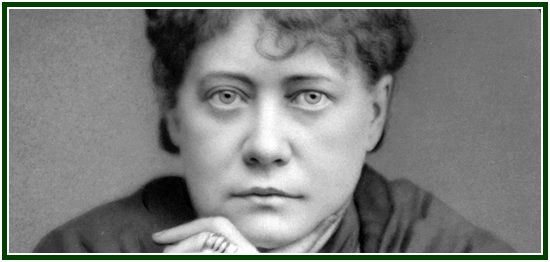
The Chohan Talks About Christianity, and
Looks at the Moral Condition of the World
Carlos Cardoso Aveline

A popular image of Christ, and the front Cover of “Letters
from the Masters of the Wisdom – First Series”, fourth edition
* The Maha-Chohan is a higher level Mahatma or Adept, whom the spiritual teachers of Helena P. Blavatsky revere as their own master. Letter 01 in “Letters From the Masters of the Wisdom – First Series” reproduces the document generally known by the name of “The Letter from the Maha-Chohan”. It consists of an 1881 letter from a Master of the Wisdom which narrates what the Maha-Chohan said when consulted on the dharma and duty of the modern theosophical movement, which had been created almost seven years earlier, in 1875.
* The document is seen by some as one of the most important theosophical texts of all time. It includes severe criticisms regarding dogmatic religions. Yet it also shows that the Maha-Chohan has a positive view of Mystical Christianity, and of the inner traditions of wisdom present in every religion. [1]
* The Chohan says: “Mystical Christianity, that is to say that Christianity which teaches self-redemption through our own seventh principle [2] – this liberated Para-Atma (Augoeides) called by some Christ, by others Buddha, and equivalent to regeneration or rebirth in spirit – will be found just the same truth as the Nirvana of Buddhism. All of us have to get rid of our own Ego, the illusory apparent self, to recognize our true self in a transcendental divine life. But if we would not be selfish, we must strive to make other people see that truth, to recognize the reality of that transcendental self, the Buddha, the Christ, or God of every preacher.” (Page 6.)
* What about the moral condition of humanity? According to this report from a Master of the Wisdom, the Chohan said: “To be true, religion and philosophy must offer the solution of every problem. That the world is in such a bad condition morally is a conclusive evidence that none of its religions and philosophies, those of the civilised races less than any other, have ever possessed the truth.” (Page 11.) The words “civilised races”, here, is a reference to the materially richer nations of the West, id est, the colonialist and neocolonialist countries which present themselves as “the police of the world” and fabricate wars to impose their power.
* That the theosophical movement started failing in Ethics even while HPB was physically alive can be seen in the article “Helena Blavatsky’s Self-Criticism”. It is easy to realize therefore that the central task of theosophists in the 21st century must include facing the moral and ethical task now challenging mankind, for morality is the art of sowing good Karma, and one must deserve, before desiring spiritual progress.
* The Letter of the Maha-Chohan makes a warning: “Between degrading superstition and still more degrading brutal materialism, the white dove of truth has hardly room where to rest her weary unwelcome foot.” (Page 4.) And it adds:
* “Once unfettered and delivered from their dead-weight of dogmatic interpretations, personal names, anthropomorphic conceptions and salaried priests, the fundamental doctrines of all religions will be proved identical in their esoteric meaning. Osiris, Chrishna, Buddha, Christ, will be shown as different names for one and the same royal highway to final bliss Nirvana.” (Pages 5-6.)
* That there are many ideas in common between Mystical Christianity and the Eastern masters of the wisdom is also clear from Letter 2 in the same book.
* “Be true, be loyal to your pledges, to your sacred duty, to your country, to your own conscience”, says the letter. And the Master adds: “Be tolerant to others, respect the religious views of others if you would have your own respected”. (“Letters From the Masters of the Wisdom – First Series”, Page 12.)
* In a post scriptum to the same letter, the master mentions the need for self-purification and forgives the personal mistakes of students. While referring to the moral duty of every pilgrim, the teacher uses words often found in Christian churches, such as sin and forgiveness:
* “May no further Karma attach to those who have sinned last year in thought as well as in deed. Personally they are forgiven. Let a new year and new hopes begin for them.” (“Letters From the Masters”, Page 13.)
NOTES:
[1] Examine page 6 of the book “Letters From the Masters of the Wisdom – First Series”.
[2] The masters often refer to the seven principles of consciousness, for they help us understand the connection between human individuals and cosmic life. On this central topic – largely ignored in pseudo-theosophy -, read the articles “The Seven Principles of Consciousness”, “The Seven Principles of the Movement”, “The Seven Principles” (this one by HPB), and “Antahkarana, the Bridge to Sky”.
000
The article “The Mahatmas and Christianity” was published on the websites of the Independent Lodge of Theosophists on 31 March 2025. An initial version of it, having no indication as to the name of the author, is part of the July 2023 edition of “The Aquarian Theosophist”, pp. 7-8, under the title of “Thoughts Along the Road”.
000
Read more:
000

Helena Blavatsky (photo) wrote these words: “Deserve, then desire”.
000